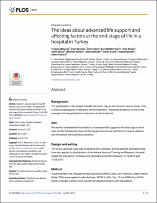| dc.contributor.author | Albayrak, Turgay | |
| dc.contributor.author | Şencan, İrfan | |
| dc.contributor.author | Akça, Ömer | |
| dc.contributor.author | Koç, Esra Meltem | |
| dc.contributor.author | Aksoy, Hilal | |
| dc.contributor.author | Ünsal, Selim | |
| dc.contributor.author | Bülbül, İskender | |
| dc.contributor.author | Bahadır, Adem | |
| dc.contributor.author | Kasım, İsmail | |
| dc.contributor.author | Kahveci, Rabia | |
| dc.contributor.author | Özkara, Adem | |
| dc.date.accessioned | 2019-05-13T09:07:19Z | |
| dc.date.available | 2019-05-13T09:07:19Z | |
| dc.date.issued | 2017 | |
| dc.identifier.citation | Albayrak, T., Şencan, İ., Akça, Ö., Koç, E. M., Aksoy, H., Ünsal, S., Bülbül, İ., Bahadır, A. [et.al.]. (2017). The ideas about advanced life support and affecting factors at the end-stage of life in a hospital in Turkey. PloS one, 12(7), e0181456. | en_US |
| dc.identifier.issn | 1932-6203 | |
| dc.identifier.uri | https://doi.org/10.1371/journal.pone.0181456 | |
| dc.identifier.uri | https://hdl.handle.net/11491/1775 | |
| dc.description.abstract | Background The participation of the people in health decisions may be structured in various levels. One of these is participation in decisions for the treatment. “Advanced directives” is one of the examples for the participation in decisions for the treatment. Aim We wanted to determine the decisions on advanced life support at the end-stage of life in case of a life-threatening illness for the people themselves and their first degree relatives and the factors effecting these decisions. Design and setting The cross-sectional study was conducted with volunteers among patients and patient relatives who applied to all polyclinics of the Ankara Numune Training and Research Hospital except the emergency, oncology and psychiatry polyclinics between 15.12.2012 and 15.03.2013. Method A questionnaire, the Hospital Anxiety Depression (HAD) scale, and Templer’s Death Anxiety Scale (TDA) were applied to all individuals. SPSS for Win. Ver. 17.0 and MS-Excel 2010 Starter software bundles were used for all statistical analysis and calculations. Results The participants want both themselves and their first degree relatives included in end-stage decision-making process. Therefore, the patients and their families should be informed adequately during decision making process and quality communication must be provided. Conclusion Participants who have given their end-stage decisions previously want to be treated according to these decisions. This desire can just be possible by advanced directives.When moral and material loads of end-stage process are taken into consideration, countries, in which advanced directives are practiced, should be examined well and participants’ desire should be evaluated in terms of practicability. © 2017 Albayrak et al. This is an open access article distributed under the terms of the Creative Commons Attribution License, which permits unrestricted use, distribution, and reproduction in any medium, provided the original author and source are credited. | en_US |
| dc.language.iso | eng | |
| dc.publisher | Public Library of Science | en_US |
| dc.relation.isversionof | 10.1371/journal.pone.0181456 | en_US |
| dc.rights | info:eu-repo/semantics/openAccess | en_US |
| dc.rights | Attribution 4.0 International (CC BY 4.0) | * |
| dc.rights.uri | https://creativecommons.org/licenses/by/4.0/ | * |
| dc.subject | [Belirlenecek] | en_US |
| dc.title | The ideas about advanced life support and affecting factors at the end-stage of life in a hospital in Turkey | en_US |
| dc.type | article | en_US |
| dc.relation.journal | PLoS ONE | en_US |
| dc.department | Hitit Üniversitesi, Tıp Fakültesi, Dahili Tıp Bilimleri Bölümü | en_US |
| dc.identifier.volume | 12 | en_US |
| dc.identifier.issue | 7 | en_US |
| dc.relation.publicationcategory | Makale - Uluslararası Hakemli Dergi - Kurum Öğretim Elemanı | en_US |



















